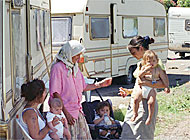Swiss doctor put forward as candidate for Nobel Peace Prize

A Swiss doctor has been put forward as a candidate for this year's Nobel Peace Prize for his lifelong efforts to improve the lot of gypsies.
Jan Cibula, himself of gypsy origins, has received five nominations from academic institutions for the coveted prize, which was first awarded in 1901.
This year, there are some 120 nominees for the prize, including the Cuban leader, Fidel Castro, and FIFA, the football association.
“I’m up against some tough competition,” says Cibula, who nevertheless remains unperturbed by the prospect. “The nomination is a huge honour for the gypsy community. No other people have a greater need for peace.”
There are an estimated 12 to 15 million gypsies scattered throughout the world, with a substantial percentage of those living in Eastern Europe. It is there, and particularly in Romania and Yugoslavia, that persecution is at its most acute, says Cibula.
Cibula explains that racially motivated attacks in the region are rife, and that authorities do not intervene to put a stop to them. Gypsies also have a tough time finding work and often end up living on the fringes of society, he says.
These factors go some way towards explaining the influx of gypsies to Western Europe, particularly to Finland and Britain.
Persecution of the gypsy community reached its peak during the Second World War, when an estimated half a million gypsies died at the hands of the Nazis.
Cibula’s own family lived through that turbulent period, when German troops rounded up the gypsies in his native village of Klenovec, in the south of Slovakia, just before the end of the war in 1945. Cibula remembers that his parents hid him away in a barn for safety, until the Allies arrived.
Cibula’s father and grandfather were both musicians. “They were poor in the material sense of the word, but their souls were rich,” he recalls.
Although his parents were illiterate, they encouraged their son to read as much as possible, and Ciluba went on to read medicine at the University of Bratislava.
Cibula staged his first parade for gypsy rights at an early age, marching with “Upre, Roma” (“Rise, gypsies!”) as his motto. He came to Switzerland “in search of democracy” in 1968, after the suppression of the Prague Spring. Ever since then, Ciluba has worked untiringly for the principles of democracy.
Cibula’s home in Bern, where he has worked as a doctor since 1973, was for many years also the headquarters of International Romani Union, an organisation for gypsy rights, which Cibula helped to set up in 1971.
The group is now recognised by the United Nations as a non-governmental organisation with observer status. For years, Cibula has fired off letter after letter on behalf of the Union to heads of state, the Pope, and international organisations, in an attempt to raise the profile of gypsies.
Ciluba has also organised many congresses, and he was called up, in 1985, by the United Nations and the Swiss government to act as mediator when gypsies blocked a Swiss motorway to protest at injustices.
The crisis was diffused after Cibula used his powers both as a negotiator – and as a violinist – to cool tempers.
Ciluba was nominated for the peace prize by the Union of Czechoslovakian Gypsies in Canada, with the backing of the University of Nitra in Slovakia, the Faculty of Philosophy at the University of Prague, and the Museum of Gypsy Culture in Brno, in the Czech Republic. The Institute of Gypsy studies in Chandigarh, in India, also supports the nomination.
The Nobel prize committee is due to reach its decision in October, but Cibula is not too optimistic about winning the prize, explaining that the gypsies’ cause is still considered a fringe issue.
However, Cibula has another project up his sleeve: he plans to archive of all his gypsy-related documents, and he is currently looking for sponsors.
Up until now, the cost of Cibula’s work for the gypsy cause has mostly come out of his own pocket. “One individual can achieve so much,” he says.
swissinfo

In compliance with the JTI standards
More: SWI swissinfo.ch certified by the Journalism Trust Initiative
You can find an overview of ongoing debates with our journalists here. Please join us!
If you want to start a conversation about a topic raised in this article or want to report factual errors, email us at english@swissinfo.ch.